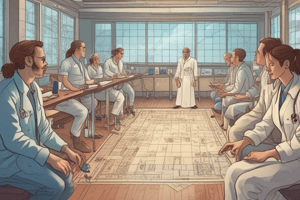Podcast
Questions and Answers
Which of the following is NOT a characteristic of science?
Which of the following is NOT a characteristic of science?
- Scientific claims are tested against observations.
- Science is always a work in progress.
- Science can make moral and aesthetic decisions. (correct)
- Science seeks to explain the natural world.
Science seeks to explain the natural world through untested ideas.
Science seeks to explain the natural world through untested ideas.
False (B)
In science, conclusions are considered ______.
In science, conclusions are considered ______.
tentative
What is the main basis of scientific understanding?
What is the main basis of scientific understanding?
Which aspect reflects that science corrects itself over time?
Which aspect reflects that science corrects itself over time?
Dogmatic attitudes are encouraged in scientific approaches.
Dogmatic attitudes are encouraged in scientific approaches.
What is the relationship between science, mathematics, and technology?
What is the relationship between science, mathematics, and technology?
What principle reflects that inferences can be drawn from scientific data?
What principle reflects that inferences can be drawn from scientific data?
Flashcards are hidden until you start studying
Study Notes
Nature of Science
- Science seeks to explain the natural world by gathering evidence through senses and their extensions.
- Scientific ideas are developed through reasoning, using logical conclusions based on observable facts.
- Scientific claims are tested against observations of the natural world, and those that fail are rejected.
- Scientific conclusions are reliable but tentative, meaning they are open to scrutiny and modification with new evidence.
- Science is not democratic; ideas are accepted or rejected based on evidence.
- Science is non-dogmatic, meaning explanations are accepted only to the degree that are well-founded and continue to stand up to scrutiny.
- Science cannot make moral or aesthetic decisions, as these are subjective and cannot be tested empirically.
Example of Scientific Correction
- Spontaneous Generation, the theory that living organisms arise from non-living things, is an example of a past scientific idea that was later proven inaccurate.
Technology
- Technology, derived from the Greek words "techne" meaning "art, skill, cunning of hand" and "logia" meaning "the application of scientific knowledge," is the use of scientific knowledge for practical purposes, especially in industry and for human benefit.
Studying That Suits You
Use AI to generate personalized quizzes and flashcards to suit your learning preferences.




